人教版课标必修一 Unit 2 English around the World学案
- 格式:pdf
- 大小:516.32 KB
- 文档页数:25
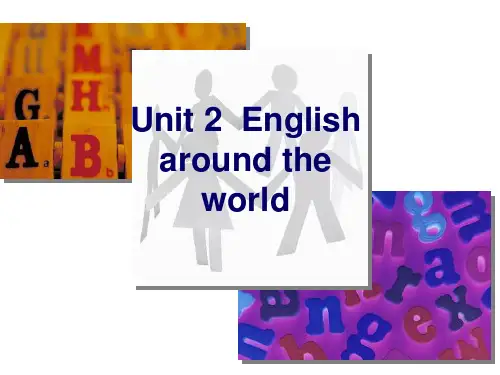
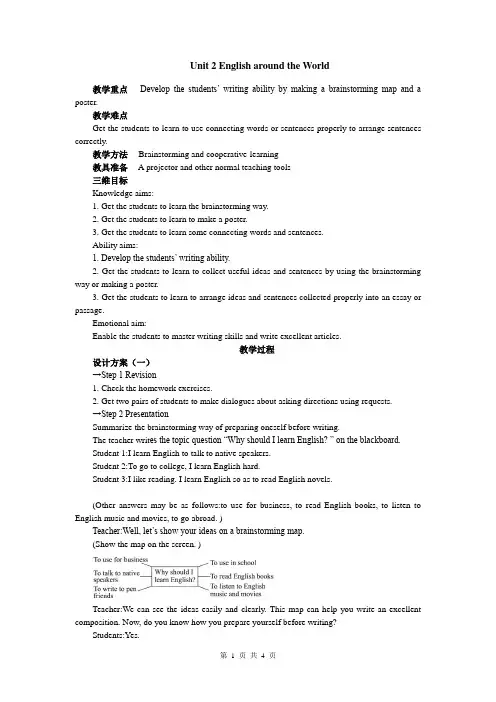
Unit 2 English around the World教学重点poster.教学难点Get the students to learn to use connecting words or sentences properly to arrange sentences correctly.教学方法operative-learning教具准备三维目标Knowledge aims:1. Get the students to learn the brainstorming way.2. Get the students to learn to make a poster.3. Get the students to learn some connecting words and sentences.Ability aims:1. Develop the students’ writing ability.2. Get the students to learn to collect useful ideas and sentences by using the brainstorming way or making a poster.3. Get the students to learn to arrange ideas and sentences collected properly into an essay or passage.Emotional aim:Enable the students to master writing skills and write excellent articles.教学过程设计方案(一)→Step 1 Revision1. Check the homework exercises.2. Get two pairs of students to make dialogues about asking directions using requests.→Step 2 PresentationSummarize the brainstorming way of preparing oneself before writing.The teacher writ es the topic question “Why should I learn English? ” on the blackboard.Student 1:I learn English to talk to native speakers.Student 2:To go to college, I learn English hard.Student 3:I like reading. I learn English so as to read English novels.(Other answers may be as follows:to use for business, to read English books, to listen to English music and movies, to go abroad. )Teacher:Well, let’s show your ideas on a brainstorming map.Teacher:We can see the ideas easily and clearly. This map can help you write an excellent composition. Now, do you know how you prepare yourself before writing?Students:Yes.→Step 3 Making a brainstorming mapThe teacher writes down the topic question “How can learning English help China in the future? ” on the blackboard. Ask students to make a brainstorming map with a partner.Several minutes later, ask a student draws the map on the blackboard.Sample map:→Step 4 Mak ing a posterFirst ask the students to make guesses about how English can help some aspects of Chinese life, in particular its economy. Then, students work on their poster in pairs. Finally, ask several pairs to present their poster in class for assessment.Sample posterWorld trade is done in English;International organizations(such as the UN)use English;We need contact with the developed Western world to build our country;The developed world uses English in its dealings.Why the Chinese language will not do?Very few people in the West speak Chinese;Chinese is a difficult language to learn;Most businessmen do not have time to learn new languages every time they entera new international market.→Step 5 Writing a short passage1. The title is “Should we learn English? ”2. Show the structure on how to write the passage.1)State your points of view.2)Show the supporting reasons.3)Get a conclusion3. Show the students connecting words which can help them to join the sentences and paragraphs.Illustration:I think. . . , I believe. . . , In my opinion. . . , As far as I am concerned. . .Addition:firstly, secondly, then, besides, at last. . .Contrast:however, but, on the other hand. . .Summary:in short, in a word, therefore, so. . .Sample passage:Should we learn English?Many people all over the world speak English as their second language. It is not too much to say that it has become an international language. So I strongly think we should learn English.Firstly, learning English can make life fun. It enables you to watch American movies, readEnglish books and listen to English songs. Moreover, as English is an international language, you will be able to communicate with foreigners when you are on a trip abroad. Traveling will be more interesting that way.Secondly, it is a good idea to make friends with foreigners. In my opinion, it is the best way to improve your English. In addition, it will be fun and it will expand your view of the world. If you make friends with a native speaker, you can practice your spoken English more often and then you can communicate with people around the world. You can also become familiar with the customs and habits of different cultures.However, there are some people who are afraid to make friends with foreigners because they are not confident of their English. However, many foreigners do not care about grammar. They will get your key words in the sentence and figure out the whole meanings. Therefore, it is unnecessary to be afraid to make friends with them; just go ahead!Learning English helps us meet different people and learn more about their culture, thus facilitating mutual understanding and harmony. Briefly said, English is so useful to us that we should all learn it.→Step 6 HomeworkWriting task on Page 53 in the workbook.设计方案(二)→Step 1 Revision1. Check the homework exercises.2. Get two pairs of students to make dialogues about asking directions using requests.→Step 2 PresentationSummarize the brainstorming way of preparing oneself before writing.→Step 3 Making a brainstorming mapWrite down the topic question “How can learning English help China in the future? ”on the blackboard. Ask students to make a brainstorming map with a partner. Several minutes later, ask a student draws the map on the blackboard.→Step 4 Making a posterFirst ask the students to make educated guesses about how English can help some aspects of Chinese life, in particular its economy. Then, students work on their poster in pairs. Finally, ask several pairs to present their poster in class for assessment.→Step 5 Writing a short passage1. The title:Should we learn English?2. The structure on how to write the passage:1)State your points of view.2)Show the supporting reasons.3)Get a conclusion.3. Connecting words:Illustration:I think. . . I believe. . . In my opinion. . .Addition:firstly secondly then besides at last. . .Contrast:however but on the other hand. . .Summary:in short in a word therefore so. . .→Step 6 HomeworkWriting task on Page 53 in the workbook.板书设计Unit 2活动与探究More and more people learn and speak English. Why? Hold a group discussion, and write a short passage titled “Why is English spoken in so many places around the world? ”to list the reasons.Sample passage:Why is English spoken in so many places around the world?English is the language most widely spoken and used in the world. Why? Industrial revolution impelled the development of England and it colonized much of the world. English began to be spoken in many other countries. America’s development also contributes to the extension of English. With the development of economy, countries communicate with each other more frequently. English is widely used and is one of the official languages of the Olympic Games and the United Nations. People realize the importance of English learning. Children go to school to learn English everywhere in the world. More people speak English as their first, second or foreign language.。
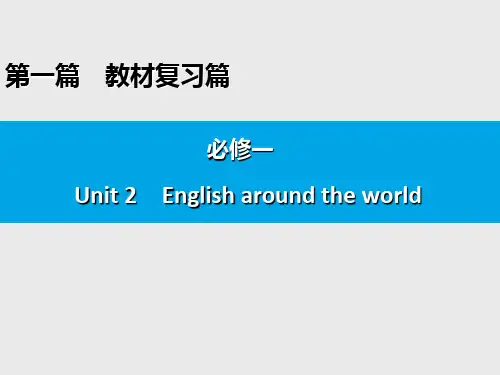
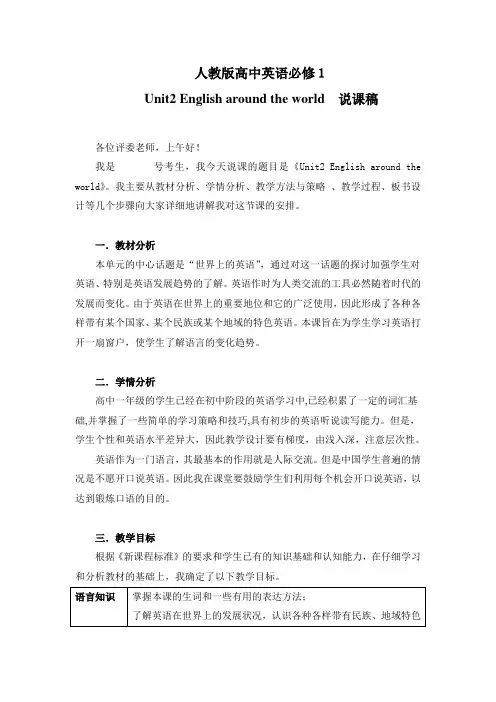
人教版高中英语必修1Unit2 English around the world说课稿各位评委老师,上午好!我是号考生,我今天说课的题目是《Unit2 English around the world》。
我主要从教材分析、学情分析、教学方法与策略、教学过程、板书设计等几个步骤向大家详细地讲解我对这节课的安排。
一.教材分析本单元的中心话题是“世界上的英语”,通过对这一话题的探讨加强学生对英语、特别是英语发展趋势的了解。
英语作时为人类交流的工具必然随着时代的发展而变化。
由于英语在世界上的重要地位和它的广泛使用,因此形成了各种各样带有某个国家、某个民族或某个地域的特色英语。
本课旨在为学生学习英语打开一扇窗户,使学生了解语言的变化趋势。
二.学情分析高中一年级的学生已经在初中阶段的英语学习中,已经积累了一定的词汇基础,并掌握了一些简单的学习策略和技巧,具有初步的英语听说读写能力。
但是,学生个性和英语水平差异大,因此教学设计要有梯度,由浅入深,注意层次性。
英语作为一门语言,其最基本的作用就是人际交流。
但是中国学生普遍的情况是不愿开口说英语。
因此我在课堂要鼓励学生们利用每个机会开口说英语,以达到锻炼口语的目的。
三.教学目标根据《新课程标准》的要求和学生已有的知识基础和认知能力,在仔细学习和分析教材的基础上,我确定了以下教学目标。
四.教学重点难点重点:了解记叙文的文体特点,并以此指导阅读。
难点:培养学生在阅读过程中获取和处理信息的能力。
五.说教学方法根据高中生的心理特点,宜采用形式多样的教学方法和学生积极主动参与的学习方式,来激发学生的学习兴趣,让他们在学习中学会参与,在参与中学会学习。
因此我打算运用以下教学方法:(1)多媒体教学如:给学生播发相关视频(2)任务型教学法如:完成一些阅读任务(3)合作学习法如:小组讨论等六.说教学过程Step1 Lead in导入课堂的开始,我先给学生播放一段前段时间在网上很火的视频“东北小伙模仿9国口音说英语”,东北小伙模仿各国人说英语模仿得惟妙惟肖,他抓住了各国人说英语的特点。
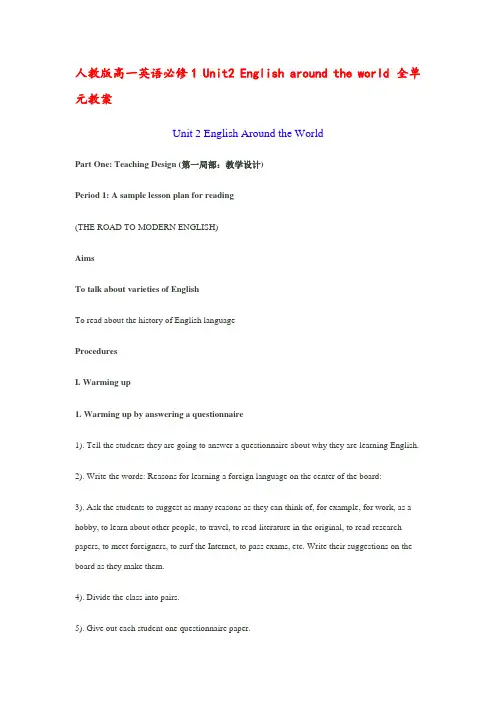
人教版高一英语必修1 Unit2 English around the world 全单元教案Unit 2 English Around the WorldPart One: Teaching Design (第一局部:教学设计)Period 1: A sample lesson plan for reading(THE ROAD TO MODERN ENGLISH)AimsTo talk about varieties of EnglishTo read about the history of English languageProceduresI. Warming up1. Warming up by answering a questionnaire1). Tell the students they are going to answer a questionnaire about why they are learning English.2). Write the words: Reasons for learning a foreign language on the center of the board:3). Ask the students to suggest as many reasons as they can think of, for example, for work, as a hobby, to learn about other people, to travel, to read literature in the original, to read research papers, to meet foreigners, to surf the Internet, to pass exams, etc. Write their suggestions on the board as they make them.4). Divide the class into pairs.5). Give out each student one questionnaire paper.6). Explain the task. The students must question each other about their language learning needs (or motivations). Tell them that you are going to take in the questionnaires at the end, and that you’d like them to make clear notes. It works better if the two partners swap tasks (questions and answers) after each section of the questionnaire. If they wait till the end to swap, one student may use up all the time available.7). When the task is finished, ask a couple of students to summarize their partners’ answers. (This may develop into a class discussion about language needs).8). The students write five sentences on their feeling about learning English.9). Collect the questionnaires.2. Further applyingTo get the students thinking about the topic of the reading passage.1). Have a student list on the board all the English-speaking countries in the world that they can think of.2). Give the students hints about the places they haven’t mentioned.3). Provide the students with an opportunity to think about the reasons for the spread of English around the world.★English is one of the official languages of the Olympic Games and the United Nations.★English dominates international websites and provides nearly all of the new computer terminology.★Tourism and trade from Western Europe and North America has contributed to the spread of English.★Satellite TV, radio programs like Joy FM, CDs and, of course, Hollywood films all broadcast English into China. Also, a number of Chinese films include English subtitles.II. Reading1. SkimmingRead quickly to get the main idea of the text.Let the students find out key sentence of each paragraph or ask them to summarize the main point for each paragraph in their own words.2. ScanningRead to locate particular information and complete the comprehending Exercise One.3. Following upWork in groups. Discuss the two questions and then ask two groups to report their answers to the class.1). Do you think it matters what kind of English you learn? Why?1) Why do you think people all over the world want to learn English?4. Language focus:1) even if=even though: in spite of the fact; no matter whether: He likes to help us even if he is very busy.2) communicate with: exchange information or conversation with other people: He learnt to use body language to communicate with deaf customers.3) actually=in fact: used when you are adding new information to what you have just said: We’ve known for years. Actually, since we were babies.4) be based on…:5) make use of: use sth. available6) Only time will tell: to say that something ca n only be known in the future: Will China’s national football team enter for the next finals of the World Cup? Only time will tell.Period 2: A sample lesson plan for Learning about Language (Indirect Speech (II) requests & commands)AimsTo discover useful words and expression_r_rsTo discover useful structuresProceduresI. Direct and Indirect SpeechII. Discovering useful words and expression_r_rs1. Work in pairs. Do exercises 1, 2, 3 and 4. Then check the answer you’re your classmates. The teacher helps the students discover the difference in prepositions.2. Play the tape for the students to listen and ask them to mark the sentence stress and intonation. Then practice reading in pairs.(The teacher brings the students’ attention to the Br itish and American words that are different but have the same meaning.)III. Discovering useful structures(Making commands and requests using indirect speech)1. In groups of four, think of at least three commands your teachers and parents usually give.You may follow these steps.1) Choose one who is to give the first command.2) Ask another person in your group to tell somebody what you said.3) The third person will change the request or command from direct into indirect speech.4) Change role so that each person gets the chance to give commands and turn them into indirect speech.2. Get the students thinking about the difference between the request and command.Then read the replies and decide whether they are in answer to a request or a command. Write the sentence down.★A: _______________________________________B: I’ll go and collect some wood right now, master.★A: _______________________________________B: Of course I’ll be happy to collect your shopping for you.★A:__________________________________________B: Yes. I’ll shut the door at once, Mr. Zhang.★A:_________________________________________B: No, I won’t get your coat if you talk to me like that.★A:_________________________________________B: Sorry. I’ll get that book for you right now.Period 3: A sample lesson plan for Using Language(STANDARD ENGLISH AND DIALECTS)AimsTo read out and talk about STANDARD ENGLISH AND DIALECTSTo write about learning English by brainstormingProceduresI. Warming up1. Introduction: In China there’re so many dialects that the government encourag es the whole nation to speak Putonghua, which is regarded as standard Chinese.2. Role-play: Get students to work in pairs. Let one student be a Chinese and the other a foreigner. Role-play a conversation about the Chinese language to have them discuss why Putonghua has to be used in China.II. Reading1. Get the students thinking about the topic of the text to predict what it says.2. Skimming:Read quickly to find the topic sentence for each paragraph.3. Scanning: Work in pairs. Read the text to locate particular information.1). Do you know what Standard English is from the text?2). What is a dialect? Why does American English have so many dialects?4. Language focus:1) believe it or not: used when you are going to say something that is true but surprising: Believe it or not, John cheated in the exam.2). there is no such a …as: used to say that a particular person or thing does not exist: These days there is no such a thing as a job for life.3). standard English: the form of English that most people in Britain use, and that is not limited to one area or group of people4). dialect: a variety of a language spoken only in one area, in which words, or grammar are slightly different from other forms of the same language5). play a part/role in: be one of the causes that make something happen: Besides dieting, exercising plays an important part in losing weight.III. ListeningTo introduce the students to a dialect and a form of standard “English”.You may follow these steps:1). Set the context for the students by describing the situation;2). Tell the class: you are going to listen to a boy named Buford. He speaks a Southern dialect of AmE with an East, Texas accent. Remember: pronunciation is determined by accent. On the other hand, Buford’s teacher, Jane, speaks standard BrE. (i.e. what is heard on the BBC.)3). Play the tape for the students to listen.4). Encourage the students to give the standard equivalents for the dialectic words from Buford’s story, using the context.6). Play the tape again and let the students answer the questions in pairs after listening.7). Check the answers. (Variant: you may also ask the students to retell Buford’s story in Standard English in pairs.)IV. Speaking1. Make sure the students know that the word used for directions often vary depending on what kind of English the speaker uses. Present the list to the students:2. Prepare their role-play in pairs: Be sure that one plays a speaker of British English and the othera speaker of American English. Ask students to select actual streets and location in their hometown for giving directions.3. Performance: Ask two pairs to perform their dialogue in class.V. Writing1. Making a posterFirst ask the students to make educated guesses about how English can help some aspect of Chinese life, in particular its economy.Then, in pairs students work on their poster.Finally, ask several pairs to present their poster in class for assessment.2.Writing Assessment1) Can you give persuasive reasons for the topic on your poster?2) Can you verbalize your ideas fluently?3) Can you put your own English learning experiences into a broader perspective?4) Can you organize your ideas in a logical way?5) Have you made a brainstorming map before you set out to design your poster? Do you think it helps your writing?6) What kind of mistakes have you made in your writing? What can you do to avoid such mistakes?Further ApplyingThe teacher may also guide the students to do the writhing task in the Workbook on page 53. You may take the following steps:Step 1: Students divided into groups of four share their own learning experiences and ideas about English learning.Step 2: Students make a list as follows:Step 3: Make notes about the paragraphs for the writing.Step 4: The teacher helps develop ideas in a positive and encouraging way.Step 5: Students write about the topic after class as homework.。
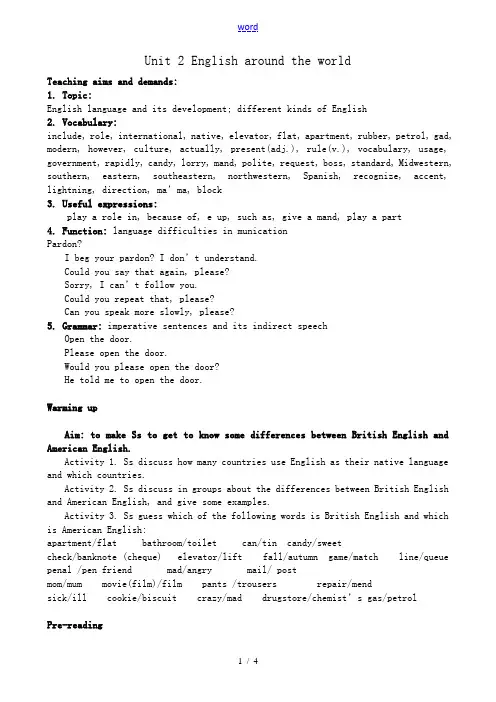
Unit 2 English around the worldTeaching aims and demands:1. Topic:English language and its development; different kinds of English2. Vocabulary:include, role, international, native, elevator, flat, apartment, rubber, petrol, gad, modern, however, culture, actually, present(adj.), rule(v.), vocabulary, usage, government, rapidly, candy, lorry, mand, polite, request, boss, standard, Midwestern, southern, eastern, southeastern, northwestern, Spanish, recognize, accent, lightning, direction, ma’ma, block3. Useful expressions:play a role in, because of, e up, such as, give a mand, play a part4. Function: language difficulties in municationPardon?I beg your pardon? I don’t understand.Could you say that again, please?Sorry, I can’t follow you.Could you repeat that, please?Can you speak more slowly, please?5. Grammar: imperative sentences and its indirect speechOpen the door.Please open the door.Would you please open the door?He told me to open the door.Warming upAim: to make Ss to get to know some differences between British English and American English.Activity 1. Ss discuss how many countries use English as their native languageand which countries.Activity 2. Ss discuss in groups about the differences between British Englishand American English, and give some examples.Activity 3. Ss guess which of the following words is British English and whichis American English:apartment/flat bathroom/toilet can/tin candy/sweetcheck/banknote (cheque) elevator/lift fall/autumn game/match line/queue penal /pen friend mad/angry mail/ postmom/mum movie(film)/film pants /trousers repair/mendsick/ill cookie/biscuit crazy/mad drugstore/chemist’s gas/petrolPre-readingAim: arouse Ss’ interest and make them be active in the class activities.Ask Ss to answer the following questions:1. How many people speak English in the world today?2. Why do so many people speak English?Reading:Aim: to let Ss know how to get the key sentence of a paragraph.Tasks:1. Read the text quickly and answer questions2. Ss read the passage and guess the meaning of the new words.3. Ss read and find out the key sentence of each paragraph.4. Ss finish prehending 1.5. Ss try to understand the meaning of the sentence: “Only time will tell.〞It means that something can only be known in the future. This sentence indicate that it remains to be seen just how much Chinese culture will influence the English language in the present century.6. Discussion: Ss in groups discuss how their generation could influence English.Learning about language:1. Discovering useful words and expressions.Answer key for Exercise 1:1 C 2D 3E 4F5A 6B 7J 8G 9 I 10 H2. Ss finish Ex 2,3 and 4.3. Discovering useful structures.a. Let Ss see how to retell the following sentences into indirect speech:“Open your books.〞 the teacher said to us.--The teacher told us to open our books.“Would you please close the window?〞 she said.-- She asked me to close the window.b. practice:S1: What do you think about the play.S2: I think it is wonderful.S3: What did he say?S1: He said that he thinks it’s wonderful.c. Tell Ss how to give mands and make requests.d. Pairs work: Ss in pairs make some dialogues using the mands/requests that they have learned.Using language:Aim: to get Ss to know that there are a lot of different dialects in the same language.Task:1. Ss discuss and answer: why putonghua has to be used in China?2. Reading: Ss read and answer the following questions〞a. What is standard English and what is a dialect?b. Why does American English have so many dialects?3. Ss in pairs talk about how many dialects they know in Chinese language and give some examples.Listening:Aim: to let Ss to get special information and take notes while listening.1. Ss listen to the tape and try to write down the American English words from the dialogue that have the same meanings as the British words listed on page 48, Ex1.2. Ss listen and answer the questions on page 48,Ex 2.3. Ss listen to the dialogues on page 12 and find the British and American words which are different but have the same meaning.4. Listen to the tape carefully and try to understand the passage with some accent. Then answer the questions on page 14 of the textbook.Speaking:Aim: to let Ss have the ability to ask ways by using indirect and direct speech and requests.1. Tell the Ss what they are going to do.2. Ss read the dialogues.3. Ss find the different words used by American and British.Subway/underground streets/ blocks4. Role-play: use the words and give their own directions.Writing:1. Ask the Ss to brainstorm with a partner on the following topic: How can learning English help China in the future?2. Ss collect their ideas and begin to write a poster.3. Ss revise the writing by themselves.4. Ss exchange their writings with their partners and correct the mistakes.5. Choose some writings to show in class.Tips for writing:Pay attention to your handwriting.Pay attention to punctuation.Use correct tenses and sentence structure.Out-of-class work:1. Learn the new words and expressions by heart.2. Surf the internet and try to find more about the differences between British English and American English.。
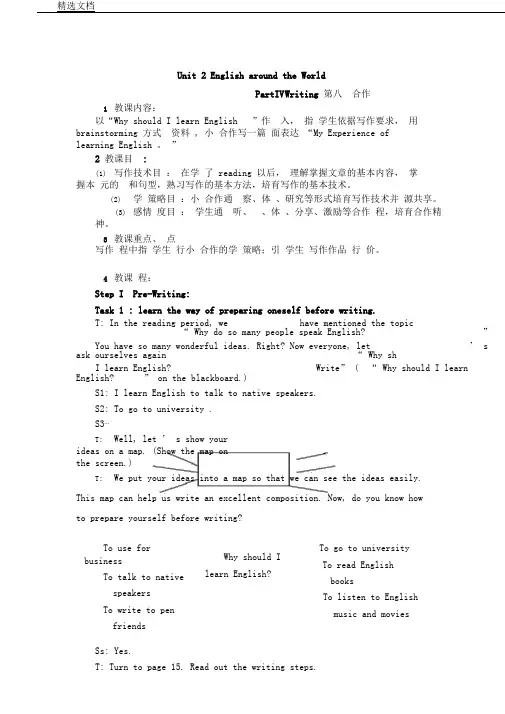
Unit 2English around the WorldPartIV W riting 第八合作1教课内容:以“Why should I learn English ”作入,指学生依据写作要求,用brainstorming 方式资料 , 小合作写一篇面表达“My Experience oflearning English 。
”2 教课目 :(1)写作技术目:在学了 reading 以后,理解掌握文章的基本内容,掌握本元的和句型,熟习写作的基本方法,培育写作的基本技术。
(2)学策略目:小合作通察、体、研究等形式培育写作技术并源共享。
(3)感情度目:学生通听、、体、分享、激励等合作程,培育合作精神。
3教课重点、点写作程中指学生行小合作的学策略;引学生写作作品行价。
4教课程:Step I Pre-Writing:Task 1 : learn the way of preparing oneself before writing.T: In the reading period, we have mentioned the topic“ Why do so many people speak English?”You have so many wonderful ideas. Right? Now everyone, let ’ s ask ourselves again “ Why shI learn English? Write” ( “ Why should I learn English? ” on the blackboard.)S1: I learn English to talk to native speakers.S2: To go to university .S3⋯T:Well, let ’ s show yourideas on a map. (Show the map onthe screen.)T:We put your ideas into a map so that we can see the ideas easily.This map can help us write an excellent composition. Now, do you know howto prepare yourself before writing?To use for businessTo talk to nativespeakersTo write to penfriendsWhy should Ilearn English?To go to universityTo read EnglishbooksTo listen to Englishmusic and moviesSs: Yes.T: Turn to page 15. Read out the writing steps.(注:是写作前的示范与剖析,向学生展现篇建构怎样由浅言因素度到深境因素,进而达到写作的目的。

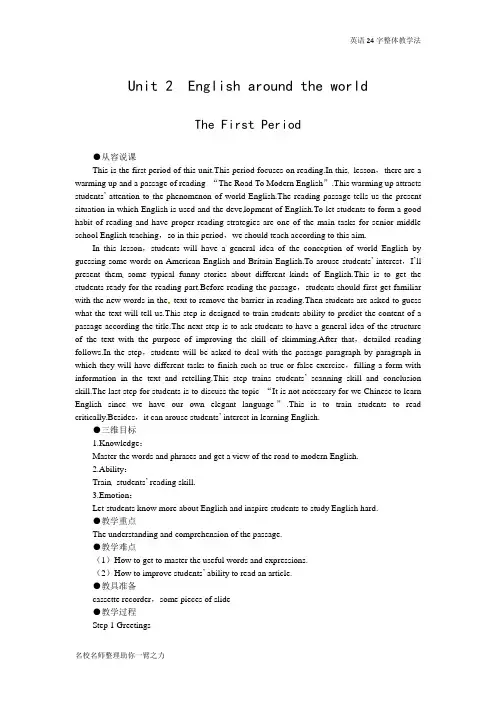
Unit 2 English around the worldThe First Period●从容说课This is the first period of this unit.This period focuses on reading.In this lesson,there are a warming up and a passage of reading “The Road To Modern English”.This warming up attracts students’ attention to the phenomenon of world English.The reading passage tells us the present situation in which English is used and the deve lopment of English.To let students to form a good habit of reading and have proper reading strategies are one of the main tasks for senior middle school English teaching,so in this period,we should teach according to this aim.In this lesson,students will have a general idea of the conception of world English by guessing some words on American English and Britain English.To arouse students’ interest,I’ll present them some typical funny stories about different kinds of English.This is to get the students ready for the reading part.Before reading the passage,students should first get familiar with the new words in the text to remove the barrier in reading.Then students are asked to guess what the text will tell us.This step is designed to train students ability to predict the content of a passage according the title.The next step is to ask students to have a general idea of the structure of the text with the purpose of improving the skill of skimming.After that,detailed reading follows.In the step,students will be asked to deal with the passage paragraph by paragraph in which they will have different tasks to finish such as true-or-false exercise,filling a form with information in the text and retelling.This step trains students’scanning skill and conclusion skill.The last step for students is to discuss the topic “It is not necessary for we Chinese to learn English since we have our own elegant language”.This is to train students to read critically.Besides,it can arouse students’ interest in learning English.●三维目标1.Knowledge:Master the words and phrases and get a view of the road to modern English.2.Ability:Train students’ reading skill.3.Emotion:Let students know more about English and inspire students to study English hard.●教学重点The understanding and comprehension of the passage.●教学难点(1)How to get to master the useful words and expressions.(2)How to improve students’ ability to read an article.●教具准备cassette recorder,some pieces of slide●教学过程Step 1 GreetingsT:Good morning,boys and girls!S:Good morning,teacher!Step 2 Warming upT:English is a widely used language.Do you know in which countries English is spoken as their native language?S a:The US,the UK,Australia,Canada...T:(a slide:Nancy:Oh,there you are.Now then,did you have a good flight?Joe:Sure,we flew all the way direct from Seattle to London.Nancy:You must be very tired.Did you sleep at all on the plane?Joe:No,not really.I’m very tired.Could I use your bathroom?Nancy:Why,of course.You don’t need to ask,just make yourself at home.Let me give you a clean towel.Joe:A towel?Nancy:Yes.Here you are.The bathroom is upstairs.It’s the second door on the left.(After a while)Nancy:Have you found it?Joe:Well,eh,yes,I mean no.I mean,I found the bathroom,but I didn’t find what I was looking for!)Here is a short dialogue.Read it and discuss with your partner:What is it that Joe can’t find in the bathroom?Why can’t he find it?S b:It is the toilet.T:And why?S c:Perhaps when Joe says “bathroom”,he means a place,where there is a toilet.But in Nancy’s eyes,it is a place where people can only have a bath.T:You are right.Do you know why there’s a misunderstanding between them?S d:Because they sp eak different kinds of English.T:Great.There’s more than one kind of English in the world.In some important ways they’re different.They’re called world English.Can you guess what they include?S e:Canadian,British,American,Australian and Indian English.T:Right.So you know even two native speakers of English may still not speak the same kind of English.Look at the examples on P9.Now try to guess which of the following words are British English and which are American English.Suggested answers:Am.English:mom;on a team;rubber;gasBr.English:mum;in a team;eraser;petrolStep 3 New WordsT:From today on,we’ll learn something about English around the world.First of all,let’s get familiar with the new words.Yesterday I asked you to read the new words and look up the meaning of them.Now let’s have a game in which one of you tells us the meaning or the explanation of the words and the others guess which word it is.Let’s go!Suggested explanation:1.include:have something or somebody as one of a group.e.g.:The tour included a visit to the Science Museum.2.play a role in:have a part in3.international:connected with two or more countries4.native:(1)connected with the place where you have always lived or have lived for a long time(2)a person who lives in a particular place,especially sb. who has lived there a long time5.elevator:lift6.flat:(1)having a smooth surface (2)(Br. E)a set of rooms for living in7.apartment:(Am. E)a set of rooms for living in8.modern:of the present time or recent timee up:to move toward10.culture:the customs and beliefs,art,way of life and social organization of a particular country or group11.actually:really;in fact12.present:(1)existing or happening now (2)being in a particular place13.rule:control14.vocabulary:all the phrases and phrases you learnage:the way in which words are used in a language16.identity:who or what sb./sth. isernment:the group of people who are responsible for controlling a country or a state18.rapidly:fastT:That’s great!You’ve made a good preparation.Now please read the words together.(show words and explanations on the slide)Step 4 Pre-readingT:Just now,we’ve known that there’re many kinds of English in the world.Then why are there so many kinds?Ss:We don’t know.T:Anyway,we’ll find out the cause today.Now read the title of the passage “the road to modern English”.What do you think it will tell us?S f:I guess it will tell us the development of English.Step 5 SkimmingT:Now let’s find out whether your answer is right.So please read the passage fast in silence and find out the main idea of each paragraph.Suggested answer:Para.1:Brief introduction of the change in English.Para.2:An example of different kinds of English.Para.3:The development of English.Para.4:English spoken in some other countries.Step 6 ScanningT:You’ve mastered the structure of the passage.Now please read para.1 and 2 loud in detail.T:(several minutes later)Have you finished?Here’re some statements of which some are right while some not.Read them and then tell whether they are true or false.If false,please find out the mistake and correct it.(slides:1.Most of the English speakers in the 16th century lived in England.2.More and more people use English as their first or 2nd language.3.The US has the largest number of English speakers.4.Native English speakers can understand everything because they speak the same kind ofEnglish.)S g:The first one is true.S h:The second one is true.S i:The third one is false.China has the largest number of English speakers.S j:The fourth one is false.Native English speakers may not be able to understand everything because they do not speak the same kind of English.T:You did a very good job.Now please read para.3 after the tape.And then fill in the formThe Road To Modern EnglishThe cause:Cultures communicate with one anotherTime Things that happenedBetween AD 450and 1150Based on German1150 to 1500 Less like German;more like French→why?→because Frenchmen ruled England thenIn the 1600’s Shakespeare broadened the vocabulary.A big change in English,giving its own identity→why?→caused by “American Dictionary of the English language”written by Noah WebsterLater British people brought English to AustraliaT:We know culture communication brings about changes in English.Can you think of any effect that Chinese has on English?S k:In English there are some Chinese words such as gongfu,long time no see,...T:Great!With more closely communication of culture,English is changing more frequently.T:As we all know,English is spoken as the native language mostly in western countries.Then what about English in some other parts of the world?After reading the last paragraph,would you please say something about the present situation of English in your own words?S l:It is also spoken as a foreign or 2nd language in many other countries.For example,in India,it is used for government and education.In some African and Asian countries,it is also spoken,such as in South Africa,Singapore and Malaysia.While in China,the number of English speakers is increasing fast.T:Quite good.Step 7 DiscussionT:So far,we’ve known that English is becoming more and more important in China.It has been an important subject for Chinese students.But someone say that Chinese is a much more elegant language.So it is more important for us to master it and it is not so necessary for us to master a foreign language.Do you agree with this opinion and why?Suggested answer:I don’t agree with it.With the cultural communication becoming more and more frequent,the chance to contact foreigners,exported goods,international conferences,and so on,is more and more.As the most widely used language,English is regarded as the language used in most international situations.Thus,if we want to keep up with the times,we’d better master English and use it as a tool.Step 8 Summary and homeworkT:Today we’ve learned an article on “the road to modern English”.After class,you shouldread it again and again to get the idea of the text further.Do the exercises of comprehending and try to tell your partner something about English in our own words.That’s all for today.Class is over.●板书设计Unit 2 English around the worldThe First PeriodNew words:Main idea of each para-graph:... ...... ...●活动与探究This activity is to make research into differences between different kinds of world English and some words from other languages in English.Differences Pronunciation Spelling MeaningUsage...Words from other languages Chinese Japanese French Spanish German...●备课资料Soon There Will Be No Such Thing As “Wrong”English In this article:Senior Indian journalist Gautaman Bhaskaran says that English is so flexible that one day there will be too many variations around the world.English is a victim of its own success.The other day The Times in London displayed a cartoon showing an excited schoolboy flaunting his test scores:“I done good in English.”Days later,editors of the Oxford Dictionary of English rued the spread of what they termed “greengrocer’s English”.Grammar and syntax,they regretted,were going out of fashion.Others in England—in the Oxf ord University Press,the BBC and so on—said the incorrect use of cliches were marring the smooth flow of a great language whose ability to imbibe and absorb has been one important reason for its success.This success also stems from the language’s unique position of being the only one spoken in most parts of the world.Really,English has no boundaries.Even in countries such as Japan and China,which were not colonized by Britain,English is making a determined “conquest”.Unfortunately,such a conquest is not always welcome because a language sometimes doubles as a political weapon.At some point it ceases to be just a means of communication and English is a classic example of this.It has always led a troubled life.It has been disliked,even hated,largely because the people who originally spoke English conquered,colonized and terrorized half the world,or just about.The animosity to the language continues,at least in some places.The bitterness that the French,for instance,have for English is a g ood example of a language being giving a quasi-political role in society.Fortunately,this aversion does not run as it did some years ago,and there is a growing realization that English is the lingua franca.China and Japan,among a host of other nations,have been making serious efforts to promote the language.Some months ago there was a hue and cry in Singapore over the spread of “terrible English”which the authorities called “Singlish”.“Down with it!”they said,and urged Singaporeans to learn correct English,the phenomenal flexibility of which has often made things difficult for those who have to use it every day.Today even university graduates find it hard to pen a couple of correct sentences in it.More horrifying is that many teachers and university vice-chancellors speak and write poor and ungrammatical English.Often,they are found to be out of touch with what is called “usage”and,as we all know,this is one of the pillars the language rests on.Yet,despite the mess that English is in India,the nation has—more than two centuries after Samuel Johnson wrote his English dictionary—become the hottest destination for top lexicographers.The new 10th revised edition of the Oxford Concise English Dictionary includes hundreds of Indian words.Leading the list of 600 Indian English entries are “Hindutva”(Hindu identity),“dada”(older brother),“panchayat”(local administration),“chai”(tea),“pani”(water),“puri”(a dish made of wheat)and “dosa”(rice pancake).In fact,Indian words from 20 per cent of entries and rank as the third-largest component after American and Australian English segments.Other former British colonies such as New Zealand,South Africa and the Caribbean islands follow the Indian English collection of words.English,despite its hiccups,is endearing to the common Indian man or woman.About 150 years after Lord Macaulay introduced the language in India to create “babus”(clerks)for the British bureaucracy,70 million Indians speak English,a number that is higher than that in Britain.However,there is a sneaking fear among Puritans that with this kind of sp read,English may stop being English.While the French have fanatically preserved the purity of their language,the English have liberally allowed other influences to affect their lingo.So,what is seen as its strength —the fact that people all over the world understand it—can be an undermining obstacle.There might be a serious problem if every state or continent were to have its own version of English.As one writer said:“There is a risk in relentless atomization.”With too many variations of the language,a time may come when one group of English-speaking people may not be able to understand another.This is happening.Hear the way Singaporeans speak English.Listen to the Australians pronouncing “e”;it sounds like “a”.A few of the films made lately by British directors Ken Loach and Mike Leigh had to have subtitles in English.Accents in the north of Britain can be hard for people in the south to understand,let alone those outside the island.The point is,no language must be allowed such flexibility—anything goes in the name of functional communication—that people begin to take liberties with it.Ultimately,there may be no such thing as wrong English.The schoolboy in the Times cartoon was doing just that.He knew nobody would scold him for getting his English wrong.不久以后就没有“错误的”英语这一说了英语成了自身成功的牺牲品,前几天,伦敦的《泰晤士报》刊登了一幅漫画,上面画了一个兴高采烈的男学生炫耀他的考试成绩:“I done good in English”(我的英语成绩不错)。
![新人教版必修一 Unit 2 English around the world全单元[教案]](https://uimg.taocdn.com/fef82b3d580216fc700afd84.webp)
Teaching planTeaching aims:1. Get the students to learn different reading skills.2. Get the students to learn about the English language.Teaching important points:1. Develop the students reading ability and let them learn to use some reading strategies such as skimming, scanning, and so on.2.Enable the students to learn about English language and know different kinds of English so as to communicate with people from different countries.Teaching difficult points:Develop the students’ readi ng ability.Teaching methods :Task-based teaching and learningUnit 2English around the world知识目标:本单元需要学习的重点单词为:include role international native elevator flat apartment rubber petrol gas modern culture AD actually present(adj. )rule(v. ) vocabulary usage identity government Singapore Malaysia rapidly phrase candy lorry command request retell polite boss standard Midwestern southern Spanish eastern southeastern northwestern recognize accent lightning direction ma’am subway block本单元需要学习的重点词组为:play a role in because of come up such as play a part(in) 本单元需要学习的重点句型为:1. World English comes from those countries, where English plays an important role as a first or second language, either because of foreign rule or because of its special role as an international language. (the Attributive Clause; either. . . or. . . )2. Native English speakers can understand each other even if they don’t speak the same kind of English. (even if. . . )3. It became less like German, and more like French because those who ruled England at that time spoke French. (those who. . . )4. Today the number of people learning English in China is increasing rapidly. (the number of+ n. 作主语时,谓语动词用单数形式)5. Believe it or not, there is no such a thing as standard English. (Believe it or not, . . . )6. The US is a large country in which many different dialects are spoken. (the Attributive Clause)7. In fact, an English dictionary like the kind you use today wasn’t made until the time of the Qing Dynasty. (the Attributive Clause; not. . . until. . . )8. These men spent nearly all of their lives trying to collect words for their dictionaries. (spend. . . in doing sth. )9. At the age of fourteen, he left his village school in Scotland and taught himself while working ina bank. (while doing. . . )10. We know that languages develop and change over time and that is why we have new dictionaries from time to time. (that is why. . . )本单元需要掌握的交际功能用语为:语言交际困难(Difficulties in language communication) Pardon?I beg your pardon?I don’t understand.Could you say that again please?Sorry, I can’t follow you.Could you repeat that, please?Could you speak more slowly, please?How do you spell it, please?本单元需要掌握的语法为:祈使句及其间接引语(the imperative sentence and its indirect speech)1. 要求或命令(demands or orders)“Open the door, ” told he.→He told/ordered me to open the door.2. 请求(requests)He said, “Please open the door. /Would you please open the door? ”→He asked me to open the door.能力目标:1. 能运用所学语言知识谈论有关“世界英语”方面的话题。
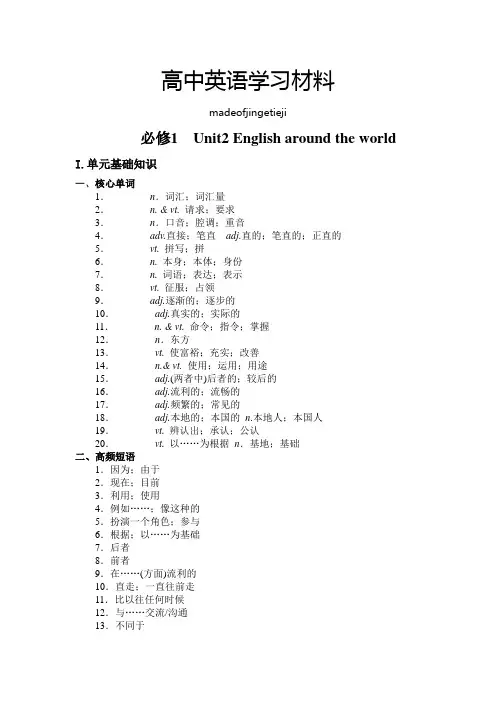
高中英语学习材料madeofjingetieji必修1 Unit2 English around the worldI.单元基础知识一、核心单词1.________n.词汇;词汇量2.________n. & vt. 请求;要求3.________n.口音;腔调;重音4.________adv.直接;笔直adj.直的;笔直的;正直的5.________vt. 拼写;拼6.________n. 本身;本体;身份7.________n. 词语;表达;表示8.________vt. 征服;占领9.________adj.逐渐的;逐步的10.________adj.真实的;实际的11.________n. & vt. 命令;指令;掌握12.________n.东方13.________vt. 使富裕;充实;改善14.________n.& vt. 使用;运用;用途15.________adj.(两者中)后者的;较后的16.________adj.流利的;流畅的17.________adj.频繁的;常见的18.________adj.本地的;本国的n.本地人;本国人19.________vt. 辨认出;承认;公认20.________vt. 以……为根据n.基地;基础二、高频短语1.因为;由于 ________2.现在;目前 ________3.利用;使用 ________4.例如……;像这种的________5.扮演一个角色;参与________6.根据;以……为基础________7.后者________8.前者________9.在……(方面)流利的________10.直走;一直往前走 ________11.比以往任何时候________12.与……交流/沟通________13.不同于________14.许多________15.毫不犹豫地________16.讲得通;有意义;言之有理________17.信不信由你________18.被期待做某事;有望做某事________19.被认为是……;被公认为…________20.走近;上来;提出 ________三、重点句型(填空)1.Native English speakers can understand each other ________ ________ they don't speak the same kind of English.以英语为母语的人,即使他们所讲的语言不尽相同,也可以相互理解。
Unit 2 English around the world学科:English 授课班级:Senior One 执教教师:授课时间:I.教学内容分析本单元通过对“世界英语”这一话题的探讨,以加强学生对英语语言的了解,对当代语言特别是英语发展趋势的了解。
世界在变化、时代在发展、社会在前进,作为人类交流的工具,语言必然随着时代的发展而变化,特别是英语,这一被公认的通用语言的变化更是让人始料不及。
由于英语在世界上的重要地位和它的广泛使用,各国人民在使用英语的过程中不断发展、改进、更新他们使用的英语和本国语。
这种不断的吸收、交融、容纳、创新就形成了各种各样带有某个国家、某个民族、或某个地区特色的英语。
II.教学重点和难点(一)了解英语在世界上的发展状况,以及各种各样带有民族、地域特色的英语。
(二)了解英语和美语的一些基本的差异,像单词的拼写,单词的发音,句式结构等。
尤其是一些常用词。
(三)掌握本单元教学目的和要求中的词汇的用法。
(四)学会英语中有关交际困难的表达法,,如Pardon? I beg your pardon?熟练掌握祈使句及其间接引语的表达法。
III.教学计划第一课时:Warming Up第二课时:Pre-reading, Reading,第三课时:Comprehending, Learning about Language第四课时:Using Language第五课时:Reading and speaking第六课时:WorkbookIV.教学步骤:Period 1 Warming UpTeaching Goals:1.Get Ss to realize that there are some differences between American Englishand British English.2.Get Ss to practise their oral English.Teaching Procedures:Step 1. Leading-inDo you like to see the film? Do you know the other name of film? Yes. It’s movie. Do you know the difference betweens the two words? One is British English and the other is American English. Do you know the differences between them? The differences between the British and American English are spelling, pronunciation, usage and the most important is culture.Step 2. Warming UpPurpose: To make students understand the differences between American and British English1. Pair work:(1) Get Ss to discuss other words that they have learned.(2) Give Ss some words and expressions and have a discussion①Words:英美电影films movies 旁注汽油petrol gas, gasoline图钉drawing thumb tack钞票banknote bill跳远long jump broad jump糖果sweets candy(1)Divide Ss into groups and ask them to make a dialogue.(2)Let Ss practice the dialogue with their partners.Periods 2 Pre-reading and ReadingTeaching Goals:1.Get Ss to learn about English spoken around the world2.Improve Ss’ reading ability, especially the skills of summarizing, word guessing andscanning.3.Get Ss to realize the importance of learning English and of love of our own country.4.Encourage Ss to think and talk in English through communicative tasks and provideSs with chances of cooperation.Teaching Procedures:Step 1. Leading-inPresent Ss with the names of seven countries (the UK, the USA, Canada, Australia, South Africa, Ireland and New Zealand), and ask S s: “Is there any relationship be tween these 7 countries?” Allow Ss to show their own opinions. The answer is that English is the mother tongue to the people in these 7 countries.1.Present Ss with the names of some other countries: India, Pakistan, Nigeria and thePhilippines. Then ask: “Is English spoken in these countries?” Allow Ss to show their own opinions. English is used as an official language in these countries, which is spoken on formal occasions like governing, schooling and news reporting.2.Also in many countries, English is learned as a foreign language, like in China, Japan,France and so on. So although English doesn’t have the most speakers in the world, it is the most popular language all over the world. Today we’re going to read a lesson entitled English around the world.Step 2. Reading1.Skimming:Get Ss to read through the passage and find the topic sentence of each paragraph.Para 1 Today, more people speak English as their first, second or foreign language than ever before.Para 2 Native English speakers can understand each other even if they don’t speak the same kind of English.Para 3 All languages change when cultures communicate with one another.Para 4 English is also spoken as a foreign or second language in South Asia.2. ScanningPurpose: To get Ss to have some details in the text.Read the text quickly and try to get some details from the text. Work in pairs and try to ask and answer questions from the text. Questions can be like these.Q1. How many people spoke English at the end of the 16th century? Where did they live?Q2. Why is English to be spoken in many other countries in the next century?Q3. Which country has the largest number of English speakers?Q4. Why has English changed over time?Q5. Why does India have a very large number of English speakers?Suggested answers:A1. At the end of the 16th century, about five to seven million people spoke English.A2. In the next century, people from England started moving to other parts of the world,so English began to be spoken in many other countries.A3. China may have the largest number of English speakers.A4.Because all languages change when cultures communicate with one another.A5.India has a very large number of English speakers. This is because Britain ruled India from 1765 to 1947.3.Careful reading:Get Ss to read the passage carefully again and meanwhile try to guess the meaning of the following words or phrases: even if, come up, actually, play a role, vocabulary, usage, identity , government.even if=even though: in spite of the fact; no matter whetherplay a role: to be involved in an activityactually: really; in factvocabulary: all the words and phrases you learnsuch as: for exampleelevator: a machine used for moving people or things up and down4.After reading:Allow Ss to discuss with their partners the meaning of the new words. Then let some Ss explain the words. The teacher can give some further explanations if necessary.5.Answer these questions.(1) Do you think what kind of English you learn matters? Why?(2) Why do you think people all over the world want to learn English?(3) Give Ss chances to ask each other questions on the passage.6. Read the passage and choose the correct answer⑴English has /had the most speakers _______.A. now B, when the British ruled many parts of the worldC. in the time of ShakespeareD. in the 12th century .⑵Which of the following sentence is true?A Language always stay the same B. Language change only after warsC .Language no longer changeD .Language change when cultures change⑶From AD450 to 1150,English sounded more like ______.A . French B. ChineseC. GermanD. Russian⑷Shakepeare’s English was spoken around_______.A. 1400’sB. 1150’sC .450’s D. 1600’s⑸Which country has the fastest growing number of English speakers in the world ?A. Australia B ChinaC. IndiaD. BritainSuggested Answers: (1) A (2) D (3) C (4) D (5) BStep 3. Discussion1.After reading the passage, we’ve learned so much about English spoken around theworld. Do you think it’s necessary to have a good knowledge of English? Why do you think so? Please form groups of four and discuss these questions with your partners.(The teacher should walk around to provide any necessary help.)2.Give the students chances to express their opinions freely.3.Summary by the teacher:Through learning this passage, we have got to know that English is becoming more and more popular all over the world now. So English learning seems important to everyone, especially us students of the new century. With China’s entry into WTO, English will play a more important part in business, in tourism, and even in people’s daily life. So it’s no doubt that everyone should have a good knowledge of English. And I hope every one in our class can make an effort to learn English well. But on the other hand, it does n’t mean English is better than Chinese just as some students said just now. We must keep it in mind that one’s mother tongue is the most beautiful language in the world. The reason why we learn English is that we should thus be more capable of building up our country(It’s a good chance to lead the students to love our own country as well as to learn English well.)Step 4. Words and expressions1. Native English speakers can understand each other even if they don’t speak the same kind of English .以英语作为母语的人,即使他们讲的英语不尽相同,也可以相互交流。
高一英语同步练习必修1 Unit 2 English around the world第2课时:Reading基础练习:阅读课文完成下列表格:单句改错:1. Thomas joined in the army last year.A B C D2. Driving is also great importance.A B C D3. They were tiring after a long day’s hard work.A B C D4. They returned back in the evening with some money and perhaps a present for their children.A B C D5.I heard that the old woman was bad injured in the leg.A B C D6. The number of members in the club are twenty.A B C D7. Can I exchange the shirt with a bigger one?A B C D8. They communicate to each other by telephone.A B C D9. If you get to my house before I do, help yourself to a drink and make yourself in home.A B C D10. The soup tastes so nicely.A B C D把下列短语翻译成英语:1.目前,现在______________2.利用,使用______________3.根据 ______________4.例如 ________________5.说英语的国家 ________________6.英语口语 ________________7.讲得通,有意义_______________8.扮演一个角色 _______________9.信不信由你 _______________10.太……而不能 _______________阅读理解AWhich is the best way to learn a language? We know that we all learnt our own language well when we were children, if we learn a second language in the same way, it won’t seem so difficult. How does a small child do? It listens to what peopl e say, and it tries to guess what it hears. When it wants something, it has to ask for it. It’s using the language, thinking in it and talking in it all the time. If people use a second language all the time, they will learn it quickly.In school, you learn to read, to write, to hear and to speak. It is the best way to learn all new words through the ear. You can read them, spell them, and write them later.1. When we were very young .A. it’s difficult for us to understand peopleB. we learnt our language through our earsC. we could not guess what people sayD. we could hear our own language but couldn’t understand it2. A small child can learn his own language very well because .A. he’s cleverB. his parents took good care of itC. he keeps on using itD. he often tries to guess what he hears3. According to the text, what is the best way to learn a second language? .A. remembering as many words as we canB. writing all the timeC. using our ears firstD. loo king up the words in the dictionary when we don’t know their meanings.4. In school, when we learn a second language, we must .A. do nothing but listen to our teachersB. often listen, speak, read and writeC. learn it by heart all the timeD. translate it into our own language all the time5. The word “it” in the sentence “it won’t seem so difficult” refers(指的是) .A. the small childB. the second languageC. learning the second languageD. the best way to learn languageBA student is learning to speak British English. He wonders: Can I communicate with Americans? Can they understand me? Learners of English often ask: What are the differences between British and American English? How important are these differences?Certainly, there are some differences between British and American English. There are a few differences in Grammar. For example, speakers of British English say “in hospital” and "Have you a pen?” , Americans say “in the hospital” and ‘Do you have a pen?’. Pronunciation is som etimes different. Americans usually sound theirs in words like “bird” and “hurt”. Speakers of British English do not sound theirs in these words. There are differences between British and American English in spelling and vocabulary. For example, “colour” and “honour” are British, “color” and “honor” are American.These differences in Grammar, pronunciation, spelling and vocabulary are not important, however. For the most part, British and American English are the same language.1.According to this passage, a student who is learning to speak American English might be afraid that __________.A. British people cannot understand himB. American people cannot understand himC. the Grammar is too hard for himD. the spelling is too hard for him2.American English and British English are different in __________.A. spellingB. pronunciationC. GrammarD. all of the above3. What is NOT mentioned(提及) in the passage?A. Whether there are differences between British English and American English.B. Whether British English and American English are one language or two.C. How the differences between British English and American English came about.D. How important the differences are.4.Most __________ say “Do you have a watch?”A. British peopleB. AmericansC. childrenD. teachers5.According to this passage, British people and Americans have __________ difficulty in understanding each other.A. littleB. muchC. someD. greatCAn old friend from New York , who was going to spend a few days with me, called from the airport to tell me that he had arrived .I was not able to leave the office, but I have prepared for his arrival.After explaining where my new house was,I told him that I had left the key under the doormat.Since I knew it would be quite late before I could get back,I suggested that he make himself at home and help himself to anything that was kept in the refrigerator(冰箱).Two hours later my friend phoned me from the house.At the moment,he said,he was listening to some of my records after having had a nice meal.He had found the pan and meat in the refrigerator.Now,he was drinking a cup of tea and hoped that I would join him soon.When I asked him if he had any difficulty finding the house,he answered that the only problem was that he had not been able to find the key under the doormat,but luckily,the living room window by the apple tree had been left open and he had climbed in through the window.I listened to all this in great surprise.There is no apple tree outside my window,but there is one by the living room window of my next-door neighbor’s house!1.When my friend arrived,I could not go to meet him because________.A.we were not good friendsB.I was busy at workC.he had not told me that he would comeD.I did not want to see him2.A doormat is a mat______.A.used as a doorB.for cleaning the bottom of shoesC. put up on a door as an ornament(装饰物)D.near a door under which people put their keys3.I listened to my friend’s phone call in great surprise b ecause____.A.he had not waited for me to eat togetherB.he had eaten too much of the foodC.he mistook my neighbor’s house for mineD.he had left the house with the window open4.At last my friend______.A.did not enter my houseB.entered my house after he opened the doorC.entered my house by climbing through the windowD.entered my house with the help of my neighbor5.The writer left the key under the doormat so that______.A.nobody would find itB.he might not lose itC.his family could use the same keyD.his friend could easily get it第2课时基础练习:1.16th century2. began to be spoken in many other countries3. foreign4. apartment5. communicate with6. German7. French- men ruled England then8. vocabulary 9. Australia 10. china改错:1.B 去in 2.C great前加of 3.A tiring-tired 4.A 去back 5.B bad-badly 6.D are-is 7.B with-for 8.B to-with 9.D in-at 10. D nicely-nice翻译:1 at present 2. make use of 3.according to 4.for example 5.an English speaking country 6. oral/spoken English 7. make sense 8.play a part in 9.believe it or not 10.too…to…阅读理解A:BCCBC B:ADCBA C: BBCAD。
Unit2 English around the world训练四基础巩固一.单句语法填空1.They are faced with the same kinds of challenges and problems in life you are.2.Of these two basketball teams,the(form)comes from the US;the latter comes from the UK.3.It used to be a long and dangerous voyage to go Europe to America by sea.4.Believe or not,all such possibilities should be considered while you are dealing with this problem.5.The news was entirely based facts,so it was convincing.6.Such a topic has been(frequent)asked about recently.7.There are many(spell)mistakes;even so,it's quite a good essay.8.The computer will play a much more important part industry,science,technology and everyday life.9.present,we need to do something to improve our living conditions first.10.While we were waiting for the bus there,a little girl came to us.1.【句意】他们面临着和你一样的挑战和问题.答案:as.本题考查完成句子,根据句意和所给部分判断可知这句话使用the same…as…意为"和…一样".2.【句意】在这两支篮球队中,前者来自美国,后者来自英国.答案:former;考查单词填空.the former前者;the latter 后者;故填former.3.【句意】从欧洲坐船到美洲过去是一次漫长而危险的航行.答案:from.本题考查完成句子,根据句意和所给部分判断可知from…to…从…到…4.【句意】信不信由你,在你处理这个问题时,所有这些可能性都应该考虑.答案:it.本题考查完成句子,根据句意和所给部分判断可知这句话使用believe it or not信不信由你.5.【句意】这消息完全是基于事实,所以很有说服力.答案:on.本题考查完成句子,根据句意和所给部分判断可知这句话使用be based on意为"以…为基础".6.【句意】最近,这样的话题经常被问到.答案:frequently;考查单词填空.修饰动词ask所以用副词.故填frequently.7.【句意】有很多拼写错误;尽管如此,这篇文章还是相当不错的.答案:spelling;考查单词填空.修饰名词mistakes所以要用形容词.故填spelling.8.【句意】计算机将在工业、科学、技术和日常生活中发挥更重要的作用.答案:in.本题考查完成句子,根据句意和所给部分判断可知play a much more important part in在…方面起着更重要的作用.9.【句意】目前,我们首先需要做一些事情来改善我们的生活条件.答案:At.本题考查完成句子,根据句意和所给部分判断可知这句话使用介词短语at present目前,现在.10.【句意】当我们在那里等公共汽车时,一个小女孩向我们走来.答案:up.本题考查完成句子,根据句意和所给部分判断可知come up to朝…走过来.和were一致用一般过去时.二.单选题(针对重点语法+单词+短语练习)1.The teacher asked us __________ so much noise.A.don't make B.not makeC.not making D.not to make2.Laura's knee pain ______ from such activities as running,hiking and horse riding.A.puts her up B.holds her backC.takes her off D.gives her away3.To recognize and respect a country's own culture does not mean to close the door toothers,_______ to stand upon a principle of being superior.A.and it means B.but it meansC.so does it mean D.neither does it mean4.Jerry didn't __________ his primary school classmate Mary until he listened to her self﹣introduction.A.know B.find C.recognize D.realize 5.Harry is_____ my neighbour.He is a good friend of mine as well.A.less than B.at least C.at most D.more than 6.Bob looked back only to find an old classmate whose name ________ him for the moment.A.escaped B.missed C.forgot D.passed7._____ protect himself,he ______ being made use of by his boss.A.In order to;denied B.So as to;deniedC.So as to;refused D.In order to;refused8.Tom use a clock to wake him up because at six o'clock each morning the train comes by his house.A.couldn't B.mustn't C.shouldn't D.needn't9.All parts of the house ______ the windows were in good condition.A.other than B.rather thanC.no more than D.better than10.The guide was enthusiastic and knowledgeable and we spent a lovely evening wandering into places which we ________ straight past otherwise.A.had walked B.were walkingC.would have walked D.must have walked1.【分析】老师让我们不要那么吵.答案是D.本题考查动词ask后接宾语补足语的用法.ask后接动词不定式做宾语补足语,即ask sb.to do sth.;动词不定式的否定式在to do前直接加not,所以它的否定结构是ask sb.not to do,故选:D.2.【分析】Laura的膝盖疼痛让她不能参加诸如跑、远足、骑马这样的活动.答案;BA.put her up 让她住宿;B.hold her back抑制她,隐瞒她;C.take her off 带她离开;D.gives her away暴露(她的真实情况或身份);出卖她.根据句意,应该是"Laura的膝盖疼痛阻碍了她的活动",意为"让她不能参加此类活动",所以选择B.3.【分析】承认和尊重一个国家自己的文化文化不意味着闭门锁国,也不意味着站在更高级的原则之上.答案:D.前一个分句是否定句,后一个分句应用neither或nor的倒装.故选:D.4.【分析】Jerry没有认出他的小学同学直到他听见她的自我介绍.本题考查动词辨析.know知道;find发现;recognize识别,认可;realize意识到.根据句意可知答案.故选:C.5.【分析】哈里不仅是我的邻居.他也是我的好朋友.答案:D.考查介词短语.less than小于;at least至少;at most至多;more than 不只是,根据题意,D正确.故选:D.6.【分析】Bob往回看,结果发现一名老同学,他的名字Bob一时忘记了.答案是A.本题考查动词词义辨析.A项表示"逃跑;(物)被忘记;泄露";B 项表示"错过,想念";C项表示"(人)忘记";D项表示"通过";根据句意,他的名字一时"被忘记"了,所以答案选择A项,其它选项不符合逻辑.7.【分析】为了保护他自己,他否认被老板利用了.A 考查词义辨析.in order to=so as to"为了",denied否认;refused拒绝;根据句意:为了保护他自己,他否认被老板利用了.所以答案选A.8.【分析】Tom 不需要闹钟叫醒他,因为每天早晨六点钟火车都会从他家的房子经过.答案是D.把本题考查情态动词辨析;couldn't不可能;mustn't禁止;shouldn't 不应该;needn't不必;根据下文的原因状语从句"每天早晨6点钟火车从他家房子旁边经过"推断Tom"不必用闹钟",所以答案选择D.9.【分析】除了窗户,这所房子的其它部分都很好.答案:A短语辨析,other than除了;rather than而不是;no more than仅仅;better than 优于.句意表达的是除了,故选A.10.【分析】句意:这位向导既热情又博学,要不是他,我们就会直接从这个地方走过,而不是在这里闲逛,度过一个愉快的夜晚.答案:C.根据题干中的otherwise判断,那晚上我们没有径直走过,应该是与过去事实相反,应该用would have done,故选:C.三.阅读理解When I was a kid,I always used to wonder how on earth my father could work outside in the winter without a coat,even when it was ﹣20℃.I would ask,"Aren't you cold,dad?" "No," he'd reply,"I'm not cold﹣working too hard to be cold."Once when I was quite young,perhaps five or so,I went ice fishing with Dad.It was a bright,clear day and bitterly cold.After we'd been out on the ice for a little while,my feet started getting cold."Daddy,my feet are cold," I said."Walk around.Make some circles in the snow and see how many different pictures on the ground you can make.That will get your feet warm," he said.I still remember my thinking at that time,"How can that make my feetwarm?Something must be wrong with Dad's mind." But he was my father,after all.So I kept walking drawing lines and circles in the snow.Very soon I was having so much fun walking in the snow.I forgot about my feet being cold.Now,all these years later,I know,too,from personal experience how my father was able to take his coat off and work outside in the winter wearing justa shirt,a cap and gloves.Because I do it,too."Aren't you cold?" my husbandasked one winter day."No," I replied,"I'm not cold﹣working too hard to be cold." I hope my husband has decided I'm both tough and smart.But I guess quite a bit of the time he thinks I'm foolish.Now,wherever Dad is in that great big farm in the sky﹣I'm sure he can't help but smile whenever I take my coat off while I'm working outside in the winter.(1)When the author's feet felt cold,her father advised her to.A go home alone firstB.keep walking in the snowC.draw pictures in the snowD.light a fire on the ice(2)Hearing her father's advice,the writer thought her father.A.forgetfulB.warm heartedC.crazyD.Cruel(3)What might the writer's husband think of her?A.Tough.B.Smart.C.Brave.D.Foolish.(4)The writer's purpose of writing this passage is to.A.remember her tough and smart fatherB.show how her father cared about herC.describe memories of her childhoodD.explain why her father loved her so much【大意】本文是一篇记叙文.本文作者主要描述了自己童年时和父亲之间的一些事情.【解析】1.B.细节理解题.根据第五段中的"Walk around.Make some circles in the snow…"可知,当作者感觉脚冷时,她的父亲建议她在雪地里来回走走.故选B.2.C.推理判断题.根据第六段中的"How can that make my feet warm?Something must be wrong with Dad's mind"可判断出,当作者听了她的父亲的建议时,她觉得她的父亲有点丧失理智.故选C.3.D.细节理解题.根据倒数第二段中的"But I guess quite a bit of the time he thinks I'm foolish"可知,作者的丈夫可能认为作者有点傻.故选D.4.C.写作目的题.根据全文内容可判断出,作者写这篇文章主要是回忆自己童年时与父亲之间的一些事情.故选C.【总结】本文是篇记叙文,主要描写某人的生平事迹、趣闻轶事、生活背景、个性特征、成长奋斗历程等,包含记叙文的时间、地点、人物、事件等要素.其特点是以时间的先后或事件的发展为主线,空间或逻辑线索贯穿文章始终,脉络清楚,可读性较强.考查学生对细节的辨认能力以及推理判断能力.学生可以抓住题干关键词,采用寻读的方法查找细节描述事实细节.四.完形填空阅读下面短文,从短文后各题所给的A、B、C和D四个选项中,选出可以填入空白处的最佳选项。
高中英语教学设计课题: Unit 2 English around the world The Road to Modern English (Reading)(New Senior English for China Student’s Book 1)设计教师: 徐丹帆授课时间: 45分钟联系电话: 622965I. Teaching Contents 教学内容Unit 2 English around the World (NSEFC Book 1)Reading: The Road to the Modern English(普通高中课程标准实验教科书(必修)人教版英语(1)第二单元《英语在世界各地》的阅读部分《通向现代英语之路》)II. Design of Teaching Objectives 教学目标设计(三维目标)1.Knowledge objectives 知识目标(1)Able to understand the meaning of following words, phrase and sentence pattern and use them properly. (掌握以下单词、短语以及句型的含义,并合理使用他们)①Important words(重点单词):Native, base, actually, gradually, rule, Danish, latter, identity, fluent②Important phrases(重点词组):Because of, come up, base on, make use of, a large number of③Important sentence pattern(重点句型)People from England made voyage to conquer other parts of the world and because of that,...in many other countries.Native English speakers can understand each other even if …the same kind of English.(2)Able to let student know the process of English change and the influence to the language when two different culture meet each other. (使学生大致了解英语演变的过程,和当在两种文化碰撞下,对语言产生的影响。